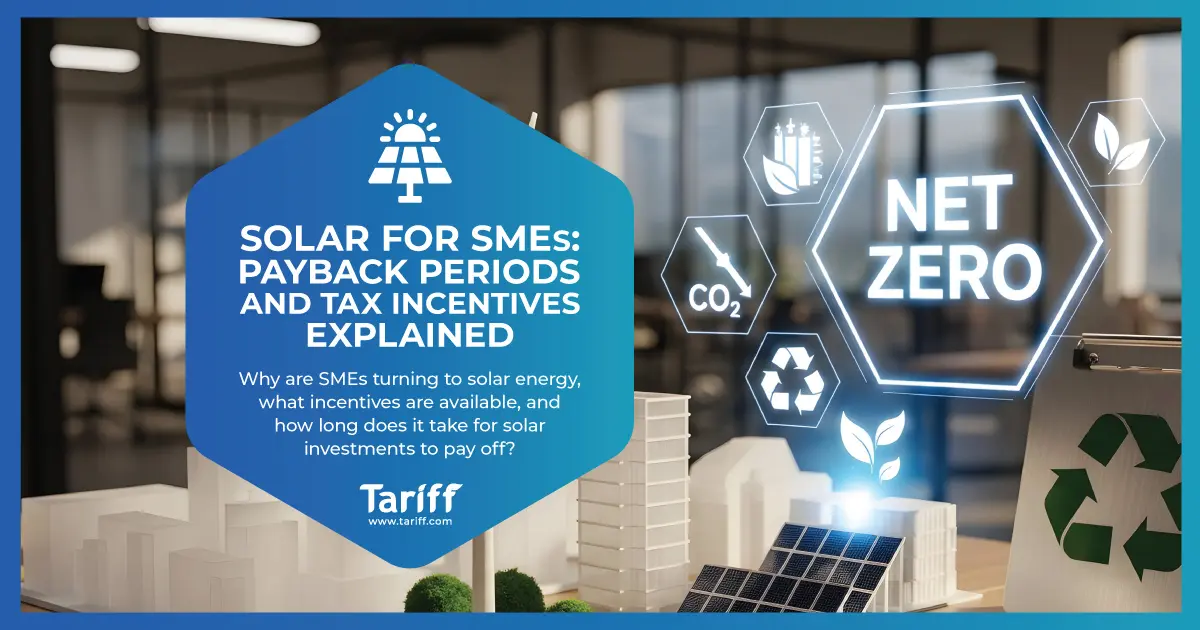The Different Business Energy Contracts Explained
Whether it’s in the uncertainty surrounding price caps and electricity rates, or the differing benefits and pitfalls associated with a range of providers, it’s safe to say that businesses face an uphill battle when choosing who to opt for with their energy.
That’s especially true with the different contracts on offer. It’s difficult to know what’s right you, your business type, and your circumstances, and the right decision on your energy can make or break your finances.
This is where Tariff can truly excel, and where our expertise and storied track record come to the fore. We know exactly what works – and what doesn’t – for businesses across all sectors, and we’re proud to bring our signature approach to finding the right energy deal to customers across the UK.
With our latest article, we’ll be applying our extensive knowledge to the world of business energy contracts, exploring what they mean for what you’ll pay, and which contract could be the ideal option for what you need.
Key Things To Know About Business Energy Contracts
Before you get into the nitty-gritty of deciding which business energy contract is right for you, there are several key factors that make it distinct from home energy. Most people assume that deals are exactly the same across the board, but that’s far from the case.
Our beginner’s guide to business utilities delves into much greater depth, but the key differences include:
- Business Energy Rates Are Usually Cheaper – Business energy is bought in bulk, meaning it’s cheaper for customers, and cheaper for the energy provider to acquire in the first place. Your business energy provider will buy the power in bulk in advance, meaning that rates are usually cheaper, but it’s also much more difficult to leave a contract.
- Business Energy Contracts Are Single Fuel Only – While most homeowners will be able to take advantage of joint electricity-and-gas contracts, businesses aren’t privilege to those same deals. This means that, if you’re one of a dwindling number of businesses to still use both gas and electric, you’ll need to get separate deals.
- Business Energy Contracts Are Longer – While most home energy deals last around a year, business energy contracts are often much longer, with providers typically offering s contracts that last between 2 and 5 years.
- Business Energy Contracts Don’t Have A Cooling Off Period – If you’ve recently migrated providers for your home energy, chances are you’ll have seen a “cooling off” period (where you can cancel your current deal within 14 days without a penalty). Business energy contracts do not have this.
There are a few, more nuanced differences to be aware of, but these 4 pointers encapsulate the core differences between home and business energy contracts. They’re also some of the key things that many business owners forget as they venture into the market, so we’d recommend familiarising yourself with these factors.
Now that we’ve addressed those, let’s break down the different types of contract you’ll typically have available to you, as well as the contracts you might find yourself on if you’re outside of the contract period.
What Are The Different Types Of Business Energy Contract?
One of the more tricky aspects of deciding on who provides your business with power, the contract you opt for is a key factor that affects what you pay, when you pay it, and (crucially) when you can seek out a new and cheaper deal.
We’ll outline all the different kinds of contracts available for business energy deals, and what they might mean for you.
1. Fixed Rate Business Energy Contracts
A fixed rate energy contract is, as you might imagine, a contract where the rate you pay for your energy is fixed at the start of your contract. This will be set at a predetermined price per kWh (kilowatt hour, the standard measurement for electricity) at the start of your energy contract.
This is usually decided in line with the current energy price guidance at the time of your contract start date. It will then remain at that rate for the rest of your contract (usually between 2 and 5 years), regardless of whether the price set out by Ofgem increases or decreases.
A crucial thing to keep in mind is that this only determines the price you pay for each unit of energy you consume – your final bill each month will still fluctuate depending on the amount of energy you use.
For instance, if you use more power to keep your premises warm overnight, or less power during the summer months, your final bill will be reflective of that.
2. Variable Rate Business Energy Contracts
Another of the more common types of contracts for business energy, a variable rate contract is often seen as the counterpart to the fixed rate deals we’ve just looked at. There’s good reason for that – a variable rate offers less stability but more potential savings, where a fixed rate contract offers increased stability without any possibility of saving costs.
A variable rate business energy contract will take the current price of energy, and move in line with the changes to the active price. This is done in line with Ofgem, the UK’s energy watchdog, and often changes in response to global instabilities in the internation energy markets, as well as sociopolitical factors and changes to infrastructure.
For example, if energy costs 25.8 pence per kWh when you first start your contract, and then increases to 27.1 pence per kWh shortly afterwards, you’ll now pay that increased rate for your energy.
3. Deemed Rate & Rollover Business Energy Contracts
These both usually fall under the banner of “out-of-contract” rates, and generally mean that you’ve not organised a new supplier or negotiated a new deal with your current supplier. They’re not an ideal place to be, unfortunately, but they’re very often where many customers find themselves if they’ve forgotten their renewal is due.
These will usually be charged at the highest rates you can pay, and are often seen as a punishment or penalty for those who’ve not responded to their energy supplier. You’ll need to get in touch with your provider to change your rate, and to switch to a more affordable tariff.
4. Extended Business Tariffs
If you’re particularly fond of the current contract you have with your energy provider, you may also ask to continue your current tariff with your provider. This isn’t a commonly offered option – EDF Energy are among the bigger providers to offer this – but it can be highly sought-after, particularly if you’ve got a good deal.
You’ll simply need to get in contact with your energy provider – or with a dedicated business energy switching service like Tariff – to check whether or not this is available to you. For some energy companies, they simply won’t offer this as an option as it could result in customers receiving a much more preferable deal for a longer period of time.
Others may be more willing to accommodate that request, particularly if you’ve been a loyal customer for a few years, or you’ve previously locked into a deal that worked well for both you and your energy provider.
Which Kind Of Business Energy Contract Is Right For Me?
This is entirely dependent on what you need from your business energy, how much energy you’re expecting to use on average each month, and how much you can afford to expend on utilities and bills as part of your monthly expenditure.
It’s first crucial to know where your business uses energy, and when it uses that power. For example, if you’re running a business that operates 24/7, you’ll naturally be consuming power throughout the night, meaning you’re likely to have a much larger carbon footprint than a smaller business that only operates between usual working hours.
Your current energy supplier will have data on how much energy you’ve used, as well as what you’re expected to use in the coming months. Alternatively, a bespoke energy switching service from Tariff will do all of that for you, discovering just how much energy you’re using before offering suggestions on the right contract for you.
As a general rule, though, it all falls down to budget. If you’re strictly limited on the amount you can spend each month on your utilities, it’s usually a good idea to opt for a deal that offers fixed prices. This allows you to better allocate funds for the power you need, and to gain a more clear understanding of what you’re spending.
It also means you can better plan for your fiscal year, especially as a set amount each month gives you a more comprehensive idea of what you’ll be spending and when. Plus, with business contracts being much longer (2 to 5 years on average), you’ll be able to plan long-term, too.
Alternatively, if you’re a small start-up, or you’ve got more capital you can put towards the electricity you’re using, a variable rate tariff could be a great option. There’s always the inherent risk of prices increasing, which is why we’d recommend have a little bit of spare funding to allow for those fluctuations.
However, there’s an equal chance that prices could decrease (and, given the current energy landscape, this currently looks more likely), meaning you’ll be saving money, and ultimately paying less for your energy bills. This is not guaranteed, though, and it’s crucial to keep that in mind, as well as the extended duration of a business energy contract.
There is a much clearer path forward, though, and with Tariff you’ll remove all the headaches associated with finding an energy deal for you, and sail forwards to a clearer energy deal that works for you.
Destress Your Business Energy Contract With Tariff
Of course, while it’s one thing understanding the different business energy contracts, it’s another entirely to know which energy provider and contract type are right for your unique circumstances. That’s why Tariff are such a pivotal tool in understanding your next steps in business energy, and in making a meaningful decision for you.
With our signature levels of service excellence and tailormade approach to organising business energy, we’re ideally positioned to get to know you and your business intimately, and to organise the right deal for your company and its energy consumption.
We’ll get to know your business inside and out, before reaching out to our network of trusted providers that includes everything from major providers like British Gas and Octopus Energy, through to smaller, more business-focused companies.
From those providers, we’ll choose a few different options, before giving you the final say in the matter before triggering the switching process on your behalf. After that point, you’ll simply need to pay your final bill, and we’ll organise the rest. It’s as easy as that.
Get in touch with our in-house experts today to discuss what we can offer for your business energy, and to receive a free, no obligation quotation.


